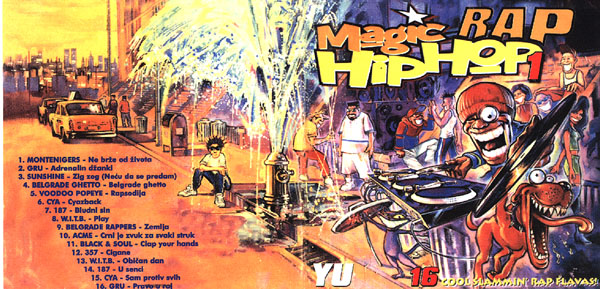
This cover for the Belgrade hip-hop bands compilation CD, looks like reflecting a picture from the street in Harlem, New York city, and the white kid with punk haircut sitting on the sidewalk could have easily been me...

This cover for the Belgrade hip-hop bands compilation CD, looks like reflecting a picture from the street in Harlem, New York city, and the white kid with punk haircut sitting on the sidewalk could have easily been me...
There is a host of countries - like former Yugoslavia, Ireland, Lebanon, Israel, South Africa... - which had an access to "western civilization" on the level of culture, but not on the level of economy or political system. So, in a way we were a part of the "western civilization": we watched the same movies (American, mostly), scribbled the same graffiti on the walls, listened to the same music (British and American, mostly) and tried to emulate dress-codes of our "western civilization" peers while living in third-worldishly poor countries ridden by war, apartheid, communism and screwed up history full of failures.
In Yugoslavia rock was around since early sixties, but it finally caught on with wide audiences in eighties through punk. Suddenly a very simple style was around which was easy to do even with very little money. So, a lot of bands just happened overnight. The punk menace swept Yugoslavia from northwest to southeast, and at some point we thought that punk is what the "western civilization" is all about, so we loved the "western civilization".
Yugoslavia was a country of artificial, ideological bonds. Different cultures and ethnoreligious groups were never allowed to form the alliance in a natural way. Rather, the alliance was forced upon them under the slogan "brotherhood and unity". This never allowed us to know each other, really. Communists were scared that they'd be not needed any more if a more substantial bonds between various groups occurred. So, they worked on preventing them: inadvertently setting grounds for their extinction and the nationalist take-over in nineties. Rock, and particularly punk, was declared a Western plague, and although it was not banned, it was officially associated with drugs and bad behavior (well, this is nothing new, isn't it?). State apparatus was bent on preventing punk rock to spread to the country. And the communists were successful.
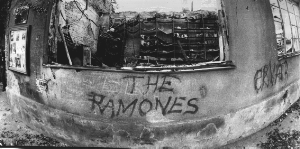 In the Northwestern-most republic of Slovenia, punk-rock
practically reached to the most remote places, creating an absurd situation in which at some
point more than 80% of a generation listened to punk music, a phenomenon that far outgrew
the alternative-goes-mainstream situation in the post-grunge America. Slovenia became a Mecca
for less corporate punk and industrial bands. I guess D.O.A. was more popular there than here.
Both the
Anti-Nowhere League and Angelic Upstarts from England even published an album with Yugoslav flags. They targeted
Yugoslavia as a market (which was first time Yugoslavia catched such a directed interest of
"western civilisation" in an event not connected to arms trade). That was the point when I
traveled to concerts in Slovenia twice a week from Zagreb, finally joining a Peace Movement in
Slovenia which later gave a lot of people who are now in Slovenian government, all punks turned
yuppies, disgustingly cynical, huh?
In the Northwestern-most republic of Slovenia, punk-rock
practically reached to the most remote places, creating an absurd situation in which at some
point more than 80% of a generation listened to punk music, a phenomenon that far outgrew
the alternative-goes-mainstream situation in the post-grunge America. Slovenia became a Mecca
for less corporate punk and industrial bands. I guess D.O.A. was more popular there than here.
Both the
Anti-Nowhere League and Angelic Upstarts from England even published an album with Yugoslav flags. They targeted
Yugoslavia as a market (which was first time Yugoslavia catched such a directed interest of
"western civilisation" in an event not connected to arms trade). That was the point when I
traveled to concerts in Slovenia twice a week from Zagreb, finally joining a Peace Movement in
Slovenia which later gave a lot of people who are now in Slovenian government, all punks turned
yuppies, disgustingly cynical, huh?
 The Slovenian example was however not repeated anywhere else. Slovenia had unique geography
- homogenous, compact nation with no big cities, but a network of townships, which helped the
spread. The rest of Yugoslavia had a more third-world model: a few big cities that look kind of
westernish and a vast underdeveloped countryside wastelands steaming with alcoholized
(Yugoslavia is a European home of "moonshine") armed rednecks. Punk-rock reached cities of
Belgrade (Serbia), Zagreb (Croatia) and Sarajevo (Bosnia) at the same time as it reached Slovenia,
but the crawl to the countryside was excruciatingly slow. It never actually reached beyond Zenica
and Tuzla in Bosnia, and beyond Pancevo and Novi Sad in Serbia. Although, I was friend with a
punk from Krusevac while I was in Yugoslav Army in 1982 - and he, obviously a Serb, was a better
friend with me than with Serbs from his hometown - a situation kind of unthinkable today. The drill sergeant assigned us to the same bunk-bed, since we both showed up with died hair and he probably thought we were fags.
The Slovenian example was however not repeated anywhere else. Slovenia had unique geography
- homogenous, compact nation with no big cities, but a network of townships, which helped the
spread. The rest of Yugoslavia had a more third-world model: a few big cities that look kind of
westernish and a vast underdeveloped countryside wastelands steaming with alcoholized
(Yugoslavia is a European home of "moonshine") armed rednecks. Punk-rock reached cities of
Belgrade (Serbia), Zagreb (Croatia) and Sarajevo (Bosnia) at the same time as it reached Slovenia,
but the crawl to the countryside was excruciatingly slow. It never actually reached beyond Zenica
and Tuzla in Bosnia, and beyond Pancevo and Novi Sad in Serbia. Although, I was friend with a
punk from Krusevac while I was in Yugoslav Army in 1982 - and he, obviously a Serb, was a better
friend with me than with Serbs from his hometown - a situation kind of unthinkable today. The drill sergeant assigned us to the same bunk-bed, since we both showed up with died hair and he probably thought we were fags.
Probably the Contact Group and Anthony Lake wouldn't take me entirely serious - but I still maintain that punk-rock was a viable alternative to "brotherhood and unity" - the first initiative for living together between Croats and Serbs which was not forced upon them. And the Rock and Roll was what ultimately brought the communism down, not Ronald Reagan.
In early eighties the Slovenian influence was felt more strongly in Belgrade than in Zagreb, because at that time Belgrade had less moronic obstructive party leaders than Zagreb. So, the legendary "Paket Aranzman" album ("Boxed Arrangement") was released featuring Belgrade new wave scene which produced excellent bands like Sarlo Akrobata, Elektricni Orgazam, Idoli and later Ekaterina Velika - which were actually always more popular in Croatia than in Serbia. They were too "western" for Serbia's interior. Croatian bands had more mellow sound and were better accepted in Serbia at the time (like Film and Prljavo Kazaliste).
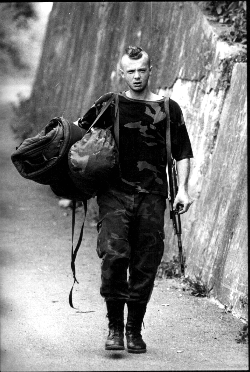 Later the scene better developed in Croatia - particularly in Istria (which benefited from the geostrategic position like Slovenia - being close to the West), Eastern Slavonia and Medjimurje. Bigger surprise was that some of
the best hard-core bands came from the Eastern Slavonia (including Majke and Ivica Culjak, the
Satan of Panonia). Croatian Slavonia and Serbian Vojvodina are part of the Panonian valley that
stretches through Hungary. Valley is actually a bottom of the sea that dried along time ago. Parts
of the valley are therefore under the sea level. Valley is known for some of the most fertile lands
in the world. The surroundings of Vinkovci in Slavonia pretty much remind you of Stephen King's
cornfield.
Under communists, small peasants were declared capitalists and mercilessly destroyed and
forced into collectives that destroyed agriculture and incentive to farm land. People left villages
and moved to cities to live in slums. Yugoslavia exported food in forthies. In eighties it imported
food. And Vinkovci looked like a ghost town, overlooked by some heavily polluting heavy industry
(the trademark of socialist landscape) and standing on the important railway crossing: the 24
hours open railway station being home to punks, prostitutes, addicts (all heroin heading West
passed through there)and other derelicts of a slowly collapsing state.
Eastern Slavonia had mixed population Serb-Croat, so the bands coming from there usually
feature multiethnicity. When Ivica Culjak went to Croatian Army he did not do so so he could
slaughter his Serbian friends. It was mostly to attack pigs.
Later the scene better developed in Croatia - particularly in Istria (which benefited from the geostrategic position like Slovenia - being close to the West), Eastern Slavonia and Medjimurje. Bigger surprise was that some of
the best hard-core bands came from the Eastern Slavonia (including Majke and Ivica Culjak, the
Satan of Panonia). Croatian Slavonia and Serbian Vojvodina are part of the Panonian valley that
stretches through Hungary. Valley is actually a bottom of the sea that dried along time ago. Parts
of the valley are therefore under the sea level. Valley is known for some of the most fertile lands
in the world. The surroundings of Vinkovci in Slavonia pretty much remind you of Stephen King's
cornfield.
Under communists, small peasants were declared capitalists and mercilessly destroyed and
forced into collectives that destroyed agriculture and incentive to farm land. People left villages
and moved to cities to live in slums. Yugoslavia exported food in forthies. In eighties it imported
food. And Vinkovci looked like a ghost town, overlooked by some heavily polluting heavy industry
(the trademark of socialist landscape) and standing on the important railway crossing: the 24
hours open railway station being home to punks, prostitutes, addicts (all heroin heading West
passed through there)and other derelicts of a slowly collapsing state.
Eastern Slavonia had mixed population Serb-Croat, so the bands coming from there usually
feature multiethnicity. When Ivica Culjak went to Croatian Army he did not do so so he could
slaughter his Serbian friends. It was mostly to attack pigs.
Serbs were policemen in Croatia: they were the ones who would ask us for ID because of our
haircuts, who would beat us at concerts or soccer stadiums, who would detain us and beat the
shit out of us in percints, who would raid our apartments without search warrants, etc. - they put Ivica Culjak in a mental hospital. Of course he wanted to kill them.
When the war started, rock in Croatia had a revival: it became hip to listen to the music popular
with your heroic liberation forces, huhuhu. In Serbia rock was in defensive. With protectionist
Croatian rock market refusing to play or sell Serbian rock music, cool bands in Serbia lost
market, and finally they've fallen victims to turbo-folk, a Serbian version of 'country'.
Paradoxically, Croatia helped Serb nationalists to get rid of their cultural opposition.
To wrap it up: non-nationalist punks of former Yugoslavia lost their world and there is no chance they'd ever regain it.
Still, you can listen to some of that rock and roll:
To my pleasant surprise Kim Simpson in Texas nurtures the same love to old Yugoslav rock and roll. (mirror)
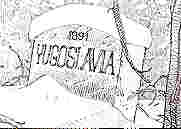 Tito, when he designed Yugoslavia to serve his eternal rule,
placed a lot of systems of checks and balances in work: so Slovenes were given control of
country's intelligence, Serbs were given control of police force and Croats were given top posts in
Army. Inside republics a minority was always chosen and given more power ensuring its loyalty
to Tito. Muslims were elevated to nationhood in Bosnia to piss off Serbs and Croats. Serbia was
divided in three parts to make it weaker. Serbs in Croatia were given the police force to keep
Croats in check. This is how Yugoslavia was enforced. And it worked until Tito died and the
merciless power struggle ensued to fill his place. But this system also created a LOT of
resentment.
Tito, when he designed Yugoslavia to serve his eternal rule,
placed a lot of systems of checks and balances in work: so Slovenes were given control of
country's intelligence, Serbs were given control of police force and Croats were given top posts in
Army. Inside republics a minority was always chosen and given more power ensuring its loyalty
to Tito. Muslims were elevated to nationhood in Bosnia to piss off Serbs and Croats. Serbia was
divided in three parts to make it weaker. Serbs in Croatia were given the police force to keep
Croats in check. This is how Yugoslavia was enforced. And it worked until Tito died and the
merciless power struggle ensued to fill his place. But this system also created a LOT of
resentment.
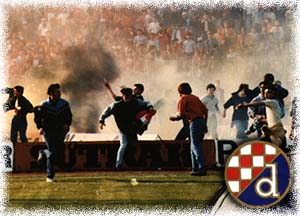 During eighties punk-rock youth merged with soccer-hooligan youth finally presenting a problem
for the state. This also presented an opportunity for Machiavellian Yugoslav politicians. Soccer-hooligans as anywhere else were nationalists. So, although soccer-punks maintained their
transnational friendships intact directing their hate more towards the system than to the
members of another nation, they adopted a host of nationalist paraphernalia to piss off police.
You did a graffiti of a swastika not because you much cared about the Nazi ideology, but because
you knew commies would seal off the area and have two inmates repaint the whole wall.
During eighties punk-rock youth merged with soccer-hooligan youth finally presenting a problem
for the state. This also presented an opportunity for Machiavellian Yugoslav politicians. Soccer-hooligans as anywhere else were nationalists. So, although soccer-punks maintained their
transnational friendships intact directing their hate more towards the system than to the
members of another nation, they adopted a host of nationalist paraphernalia to piss off police.
You did a graffiti of a swastika not because you much cared about the Nazi ideology, but because
you knew commies would seal off the area and have two inmates repaint the whole wall.
 I guess somewhere in late eighties politicians realized they'd be
unable to fight that plague further, so they decided to go along. They started to cater to soccer
punks, grooming them to be an ultimate weapon against their enemies, re-directing their anger
from the "police" to the "Serbs in police" (or in Serbia to Albanians, Muslims, Slovenes and Croats
who were all together ready to suck a poor Serb dry). When the re-programming was over
Croatian president Tudjman sent them sparsely armed to Krajina to quell Serb rebellion. Results
proved disastrous. Mohawked hooligans with on average 4 bullets per person a day did not really
do much damage to Serb military, and a lot of them were killed or disabled, but they did stop the
expansion at heavy price (of their lives and lives of Serb civilians in their way). Guys are back
home now - they all got some medals, but not much more. Tudjman even changed the name of
their soccer club (totally ridiculous autocratic behavior). There is one of those
guys in Boston seeking asylum in the U.S. (from the country he just "liberated" and where he is a
war hero).
I guess somewhere in late eighties politicians realized they'd be
unable to fight that plague further, so they decided to go along. They started to cater to soccer
punks, grooming them to be an ultimate weapon against their enemies, re-directing their anger
from the "police" to the "Serbs in police" (or in Serbia to Albanians, Muslims, Slovenes and Croats
who were all together ready to suck a poor Serb dry). When the re-programming was over
Croatian president Tudjman sent them sparsely armed to Krajina to quell Serb rebellion. Results
proved disastrous. Mohawked hooligans with on average 4 bullets per person a day did not really
do much damage to Serb military, and a lot of them were killed or disabled, but they did stop the
expansion at heavy price (of their lives and lives of Serb civilians in their way). Guys are back
home now - they all got some medals, but not much more. Tudjman even changed the name of
their soccer club (totally ridiculous autocratic behavior). There is one of those
guys in Boston seeking asylum in the U.S. (from the country he just "liberated" and where he is a
war hero).

